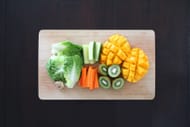The IBS diet is a diet that will help in managing irritable bowel syndrome by making a few modifications to your diet. IBS syndrome can be understood as an intestinal change that makes significant changes to your bowel movements where you might experience constipation, diarrhea, or a combination of both.
The IBS diet generally emphasizes on avoiding certain carbohydrates, eating low-fat foods, and being aware of your fiber intake.
In this article, we will discuss everything about the IBS diet along with the foods to eat and foods to avoid.

What is the IBS Diet?
A different IBS diet will help in managing the symptoms of irritable bowel syndrome. For some people, this condition can cause abdominal pain and severe cramps, which can affect your daily life. Below mentioned are two IBS diets that you can try to incorporate into your life.
1. Low FODMAP Foods
Low FODMAP is a great IBS diet that will help in better management of the condition. FODMAP foods are carbohydrates that are hard to digest, which increases gas, bloating, pain, and diarrhea.
Restricting high FODMAP foods temporarily will help in better management of IBS symptoms. After that, you can gradually introduce them back into your diet to learn about the foods that cause problems.
Research has found that people who follow a low FODMAP diet have less bloating and pain in comparison to their regular diet. Foods that you should avoid for this IBS diet include sweeteners, legumes, certain fruits (nectarines, peaches, mangoes, watermelons, plums), wheat-based pasta, cereal, bread, corn syrup, and certain vegetables (Brussels sprouts, artichokes, onions, and asparagus).
Foods that you can eat in this IBS diet include lactose-free dairy, eggs, rice, quinoa, fruits (grapes, oranges, strawberries, blueberries), meat, lactose-free products, and vegetables (zucchini, carrots, pumpkin, eggplant).
The above-mentioned low FODMAP diet for IBS can be easily assimilated into your lifestyle and is not required as such major changes.
2. Elimination Diet
Elimination diet is also an effective IBS diet that emphasizes on eating certain foods for a prolonged period of time to assess whether the symptoms of IBS improve or not. In the IBS diet, you can either restrict individual foods or restrict a wide class of foods that usually cause symptoms.
Some of the foods that are most likely to trigger the symptoms of IBS are alcohol, soda with artificial sweeteners, certain fruits, milk and ice cream, high fructose corn syrup, and certain vegetables. You can try eliminating other foods that you think cause IBS symptoms.
Food for IBS
Generally, foods that you should include in your IBS diet should be easier to digest, and does not cause bloating. The foods that you can eat on IBS are:
- Fruits like kiwis, oranges, strawberries, grapes, blueberries, and raspberries.
- Vegetables like pumpkins, eggplants, and carrots.
- Legumes are like peas.
- Sweeteners like Stevia and Agave.
- Others like oatmeal, eggs, and lean meat.

Foods to Avoid with IBS
You should typically avoid foods in your IBS diet that can be hard to digest and cause problems like gas and bloating. These include:
- Fruits like watermelon, nectarine, pears, mangoes, plums, peaches, apples, and more.
- Vegetables like broccoli, onions, artichokes, and Brussels sprouts
- Legumes like chickpeas, lentils, and kidney beans.
- Sweeteners like corn syrup, xylitol, and sorbitol.
- Other foods like alcohol, coffee, wheat products, and dairy products.
The aforementioned article discusses the IBS diet that will help in managing symptoms. These diets more or less avoid foods that tend to be high in carbohydrates and sugar, which are hard to digest. They emphasize eating low-fat foods while keeping an eye on fiber intake.
